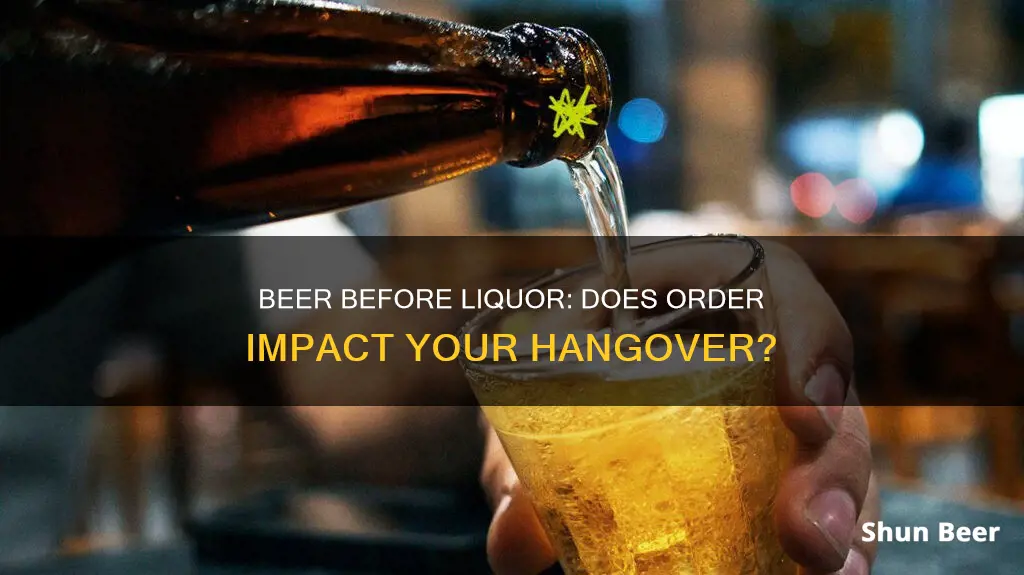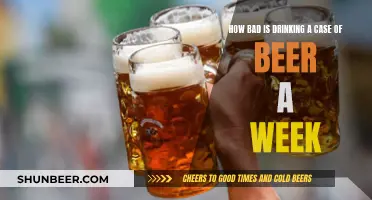
There are many theories about whether drinking beer before liquor is worse than the other way around. The popular saying goes, beer before liquor, never been sicker; liquor before beer, you're in the clear. Many people swear by this rule, but there is little scientific evidence to support it. The amount of alcohol consumed and other factors like genetics, hydration, and food intake are more significant determinants of a hangover than the order in which drinks are consumed.
| Characteristics | Values |
|---|---|
| Whether drinking order matters | No, it's a myth |
| What matters for hangovers | Total amount of alcohol consumed, drinking water, eating before drinking, etc. |
| Whether drinking liquor before beer has benefits | No, it's a myth |
| Whether drinking beer before liquor makes you sicker | No, it's a myth |
What You'll Learn
- The saying beer before liquor, never been sicker is a myth
- The amount of alcohol consumed matters more than the type
- Carbonated drinks can irritate the stomach lining, increasing alcohol absorption
- Drinking water is key to preventing hangovers
- The only way to prevent a hangover is to not drink or to drink in moderation

The saying beer before liquor, never been sicker is a myth
The saying "beer before liquor, never been sicker" is a myth. Despite its popularity, there is no evidence to support the idea that drinking order influences hangovers or how quickly a person gets drunk. In fact, multiple studies have disproven this myth.
The amount of alcohol consumed is a more significant factor in determining the severity of a hangover than the type of alcohol. Drinking on an empty stomach can also increase the likelihood of a hangover, as alcohol is absorbed more quickly into the intestines, spiking blood alcohol levels. Other factors that can affect the risk of a hangover include genetics, congeners (compounds found in alcoholic beverages), and smoking.
The myth may have originated from the idea that carbonated drinks like beer and sparkling wine can irritate the stomach lining, increasing the rate of alcohol absorption. However, this does not mean that drinking beer before liquor will necessarily result in a worse hangover. It is also speculated that people tend to start their nights with drinks that have lower alcohol content, such as beer, and move on to liquor as the night progresses. If they get sick at the end of the night or feel terrible the next morning, they may blame it on the drinking order.
To reduce the risk of a hangover, it is important to drink in moderation, stay hydrated, and prioritize sleep after drinking.
Drinking Non-Alcoholic Beer: Is It Safe to Drive?
You may want to see also

The amount of alcohol consumed matters more than the type
The popular saying goes, "beer before liquor, never been sicker; liquor before beer, you're in the clear." This adage suggests that the order in which you consume alcoholic beverages will determine the likelihood and severity of a hangover. However, this notion has been debunked by modern research, which has found that the amount of alcohol consumed matters far more than the type or order of drinks.
The 2019 study examined the effects of consuming beer and wine in different orders and combinations on 90 adult participants. The results indicated that the order and type of alcohol did not significantly influence the severity of hangover symptoms. Instead, the amount of alcohol consumed was the primary factor contributing to hangover intensity.
This finding aligns with the general understanding that high blood alcohol levels are more likely to induce a hangover than low blood alcohol levels. Therefore, regardless of whether you drink beer, liquor, or a combination of both, the total amount of alcohol consumed is the critical factor in determining the likelihood and severity of a hangover.
It is worth noting that other factors can also influence hangover symptoms. For example, drinking on an empty stomach can cause alcohol to be absorbed more quickly and spike blood alcohol levels. Additionally, genetics, congeners (compounds found in alcoholic beverages), and smoking can all impact the severity of hangover symptoms.
In conclusion, while the "beer before liquor" saying may persist in popular culture, the amount of alcohol consumed is the primary determinant of a hangover. Responsible drinking and moderation are key to reducing the risk and severity of hangovers, regardless of the specific type or order of alcoholic beverages consumed.
Hot Car Beer: Is It Safe to Drink?
You may want to see also

Carbonated drinks can irritate the stomach lining, increasing alcohol absorption
Carbonated drinks can have a negative impact on the stomach, which may, in turn, increase alcohol absorption. The carbonation in these drinks can introduce air into the stomach, similar to the effect of eating or drinking too fast. This can cause stomach pain, bloating, and gas.
A study in the Journal of Nutrition tested the effects of carbonated beverages on 34 people and found that carbon dioxide increases gastric volume, which can lead to feelings of fullness and nausea. Another small study found that carbonated drinks can make people feel as if they've consumed more than they actually have, due to the gastric filling effect.
The carbonation in these drinks can also affect stomach acid levels and pH levels in the body. According to an August 2014 study in BMC Gastroenterology, carbonated sodas can add air and pressure to the stomach and intestines. This can slightly alter pH levels and contribute to acid reflux.
Furthermore, carbonated beverages can irritate the stomach lining by causing digestive issues such as stomach pain, bloating, and gas. These issues can slow down the digestion process and increase the absorption of alcohol into the bloodstream.
While the order in which alcoholic beverages are consumed may not directly influence the likelihood of a hangover, the speed of alcohol absorption can impact how intoxicated an individual becomes. Starting with liquor and ending with beer may help slow down the spikes in blood alcohol levels, potentially reducing the severity of a hangover.
Therefore, it is advisable to be cautious when mixing carbonated drinks with alcohol, as the irritation to the stomach lining caused by carbonation may increase alcohol absorption and intensify the effects of intoxication.
Beer and Canker Sores: Is It Safe to Drink?
You may want to see also

Drinking water is key to preventing hangovers
There are many theories about drinking beer before liquor, or vice versa, and the potential impact on hangovers. However, the order in which you consume alcoholic drinks is unlikely to significantly influence whether you experience a hangover. The total amount of alcohol consumed is a more critical factor.
That being said, drinking water is indeed key to preventing and alleviating hangovers. Alcohol inhibits the release of vasopressin, a hormone that decreases urine production, leading to increased urination and potential dehydration. Drinking water before going to sleep and keeping a glass by your bed to sip throughout the night can help prevent dehydration. It's also beneficial to add a rehydration treatment sachet or a pinch of salt and sugar to the water, as these replace lost minerals.
Drinking alcohol can also lower blood sugar levels, so eating some carbohydrates can help boost your energy levels. Additionally, drinking on an empty stomach can worsen the side effects of alcohol, so it's advisable to eat before drinking.
Texas Driving: Beers, How Many Before You're Over the Limit?
You may want to see also

The only way to prevent a hangover is to not drink or to drink in moderation
The popular saying, "beer before liquor, never been sicker; liquor before beer, you're in the clear," suggests that drinking alcoholic beverages in a particular order will reduce the risk and severity of a hangover. However, this has been debunked by modern research. A 2019 study examined the effect of beer and wine consumption in various orders and combinations and found that drinking order and type of alcohol did not influence hangover intensity.
The amount of alcohol consumed has a more significant effect on the risk and severity of a hangover than the type of alcohol or the order of consumption. Drinking on an empty stomach can also contribute to a hangover as alcohol is absorbed more quickly into the intestines, spiking blood alcohol levels.
Other factors that can affect the likelihood and severity of a hangover include genetics, congeners (compounds found in alcoholic beverages), and smoking. However, the primary determinant of a hangover remains the total amount of alcohol consumed.
To prevent a hangover, it is recommended to stay hydrated by drinking water alongside alcoholic beverages, adhere to recommended alcohol consumption guidelines, prioritize sleep, and make informed drink choices by opting for lower-alcohol-content options. Ultimately, the only foolproof way to avoid a hangover is to abstain from drinking or to practice moderation.
Ice Fishing and Beer: What You Need to Know
You may want to see also
Frequently asked questions
No, it does not matter. It is a myth that drinking beer before liquor will make you sicker. The order of consumption does not influence a person's hangover. What matters is how much you drink and whether you are drinking water with your alcoholic beverages.
There are a few theories about how this saying originated. One is that most people start their nights with drinks that have lower alcohol content, such as beer, and move on to liquor as the night goes on. So, if they get sick at the end of the night or feel terrible the next morning, they blame it on the drinking order. Another theory is that liquor's high alcohol content is more likely to spike your blood alcohol levels in a short period of time compared to beer. Therefore, finishing the night with liquor after drinking beer can quickly push a person's already elevated blood alcohol content over the edge, contributing to a hangover.
The only way to completely prevent a hangover is to not drink alcohol or to drink in moderation. However, some tips to prevent a hangover include staying hydrated, drinking in moderation, making informed drink choices, and prioritizing sleep.







